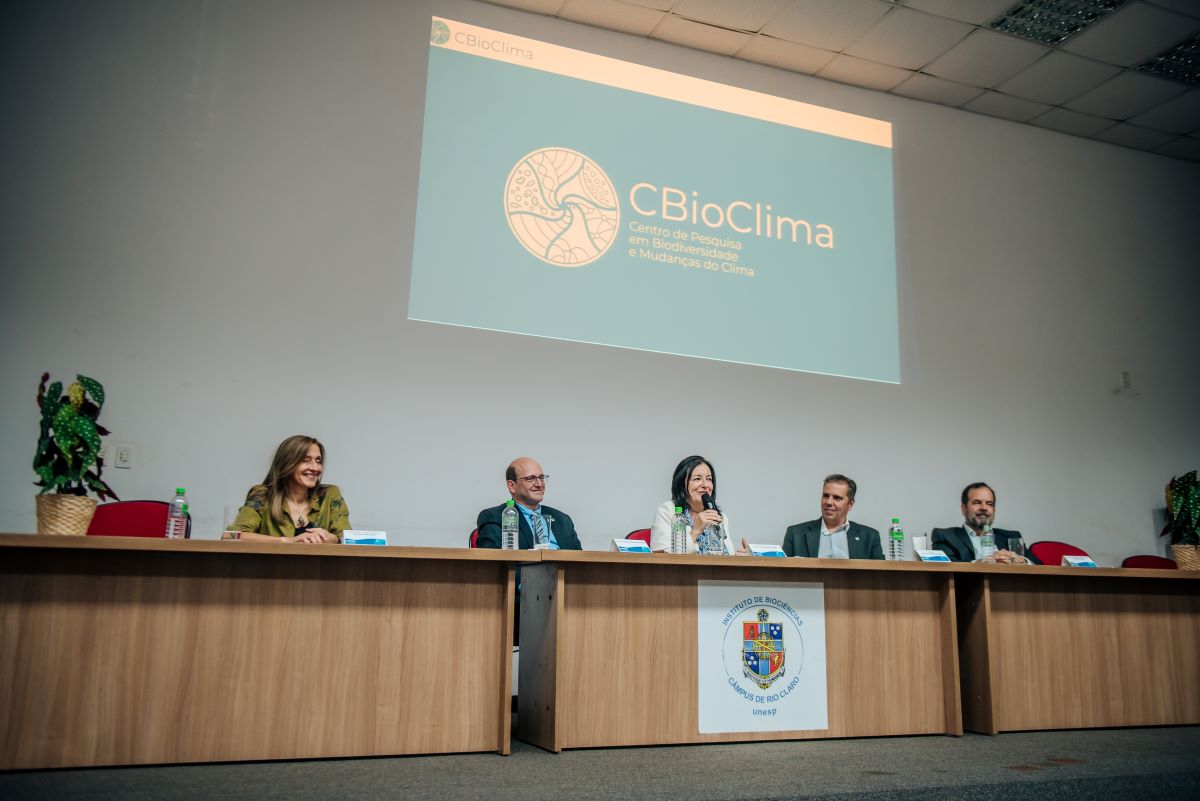

The launch event took place on April 30 at UNESP’s Institute of Biosciences (photo: CBioClima)
The first Research, Innovation and Dissemination Center (RIDC) hosted by São Paulo State University (UNESP) will promote innovation focusing on sustainable solutions and accelerated knowledge dissemination.
The first Research, Innovation and Dissemination Center (RIDC) hosted by São Paulo State University (UNESP) will promote innovation focusing on sustainable solutions and accelerated knowledge dissemination.

The launch event took place on April 30 at UNESP’s Institute of Biosciences (photo: CBioClima)
Agência FAPESP* – FAPESP and São Paulo State University’s Institute of Biosciences (IB-UNESP) in Rio Claro officially launched the Center for Research on Biodiversity Dynamics and Climate Change Research Center (CBioClima) on April 30.
CBioClima is the first of FAPESP’s Research, Innovation and Dissemination Centers (RIDCs) hosted by UNESP. Its mission is to create a biodiversity and climate change observatory that will promote innovation focusing on sustainable solutions and accelerated knowledge dissemination.
Considered a “great opportunity” and at the same time a “great responsibility” by the authorities present, CBioClima has a team of researchers committed to tackling the global challenges posed by biodiversity loss due to climate change. They will adopt a transdisciplinary approach that combines research, innovation and knowledge dissemination.
The event was attended by Professor Maysa Furlan, Vice Rector of UNESP; Professor Edson Cocchieri Botelho, UNESP’s Pro Rector for Research; Professor Adalgiso Coscrato Cardozo, Director of IB-UNESP; Professor Patricia Morellato, Director of CBioClima; and, representing FAPESP, Carlos Frederico de Oliveira Graeff, a professor at UNESP.
With almost 100 participants, from undergraduates with scholarships to master’s, PhD and postdoctoral researchers, as well as researchers in their first year of activity, CBioClima has already published more than 40 articles in scientific journals.
Its research is conducted by four working groups: Synthesis and Big Data; Natural History from Genes to Ecosystems; Dimensions of Biodiversity; and Microbiome for Sustainable Solutions. Dissemination and innovation are also part of its scope.
Cardozo emphasized the center’s importance and congratulated the members of UNESP’s faculty and technical administrative staff who set it up. “This RIDC will permit the continuous advancement of science,” he said.
For Graeff, the establishment of RIDCs is highly competitive and this one embodies the proposal that won approval over several others.
Leonardo Fraceto, CBioClima’s Head of Innovation, explained that the center will work to accelerate knowledge dissemination so that it reaches society faster. He underscored the importance of the support and partnership of UNESP’s Innovation Agency.
“It’s possible to transform projects and ideas into technology and innovation. To do so, it’s necessary to connect with opportunities and build ties with innovation environments such as technological parks, centers of technology and innovation, and incubators of high-tech startups like the UNESP Aquarium of Ideas and the Sorocaba Technology Park. With these pillars, we expect to give back to society possible solutions to the problems people are facing,” Fraceto said.
Furlan congratulated the scientists on the platform and the other participants in the RIDC, which in her view adds luster to UNESP and embodies the realization of a dream. “It’s a dream that awakes a crucial discussion. Climate and biodiversity encompass life and transformation of the world,” she said.
UNESP is honored to host the center, which “promotes an effervescent discussion, an opportunity for researchers in a range of disciplines to work together, to achieve collaboration and partnership, and to materialize transversality,” she added.
* With information from CBioClima.
Republish
The Agency FAPESP licenses news via Creative Commons (CC-BY-NC-ND) so that they can be republished free of charge and in a simple way by other digital or printed vehicles. Agência FAPESP must be credited as the source of the content being republished and the name of the reporter (if any) must be attributed. Using the HMTL button below allows compliance with these rules, detailed in Digital Republishing Policy FAPESP.





